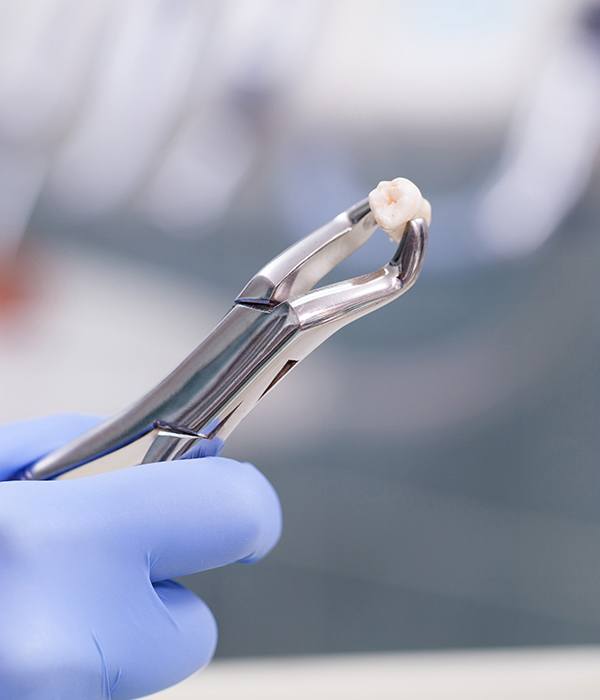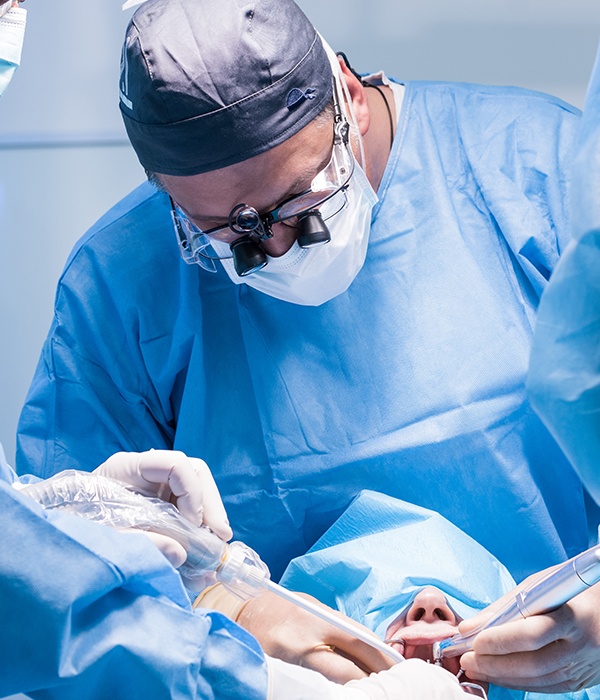
Surgical Tooth Extractions – Colorado Springs, CO
Saying Goodbye to
Troublesome Teeth

While saving them will always be the first choice where possible, teeth may need to be removed for many reasons, usually as a course of action to protect your oral health. When this happens, you’ll want to be able to turn to a periodontist for surgical tooth extractions in Colorado Springs, CO who you can trust. Our Rocky Mountain Periodontal Specialists can comfortably and expertly extract teeth. If you’re suffering from a toothache or another oral health problem, contact us for an appointment; we’ll help you find the best course of action to save the tooth – or protect the rest of them.
Why Choose Rocky Mountain Periodontal Specialists for Surgical Tooth Extractions?
-
Different Types of
Sedation Available -
Gentle, Caring, Trustworthy
Team Members -
Three Highly Experienced
Periodontists
Why Would My Tooth Need to Be Extracted?

If a tooth has been damaged to the point where preserving it is no longer a viable option, it will need to be removed. This can be the result of a physical injury or tooth decay that can’t be corrected with root canal therapy. You might also need a tooth removed to avoid issues in the future. For example, an impacted wisdom tooth can cause you a lot of pain, and not losing a baby tooth in time can hurt your child’s dental development.
In certain cases, a procedure will require certain teeth to come out. We might need to make room in a teenager’s mouth for orthodontics, or we might need to remove the last teeth remaining in an arch to make room for dentures.
What Kind of Tooth Extractions are Available?

There are two types of tooth extraction: simple and surgical.
- Simple extractions are usually done under local anesthetic and are often performed by general dentists. In a simple extraction, the entire tooth structure is removed from the socket. A tool called an elevator is used to loosen the tooth, and then forceps are used to remove it completely.
- Surgical extractions are usually more complex procedures than simple extractions. Teeth that require surgical extractions are not easy to access, such as a tooth that has broken below the gum line or a tooth that hasn’t fully erupted (which is common with wisdom teeth). The surgeon may need to section the tooth into pieces to facilitate its extractions. In some cases, it’s necessary to remove bone so the periodontist can get to the tooth structure.
Our periodontists can examine the state of your oral health and develop a treatment plan that’s suited to your situation.
Learn More About Wisdom Tooth Extractions
Why Should I See a Periodontist for a Tooth Extraction?

Infection is a leading cause of tooth extraction. If it has progressed far enough, not only will the tooth be lost but the surrounding tissues could also be damaged. (This can also easily happen if physical trauma was suffered.) Our periodontists specialize in repairing such damage and can address such issues without needing to refer you to someone else.
Furthermore, we can also offer dental implants to fill in the gap left behind by the extracted tooth. This will help prevent the bone loss that would have occurred otherwise. By visiting a periodontist, you can have the extraction, repairs and replacements all done under the same roof.
Understanding the Cost of Tooth Extractions

In the days before your tooth extraction, the last thing you want to do is to stress about the cost of the procedure. For that reason, we do everything that we can to make paying for your care as easy as possible.
Part of that comes from making sure that patients understand as much as they possibly can about the finances of the situation before beginning treatment. We’ll give you a complete estimate of the cost of care when we meet you in person. Here’s what you should know until then.
Factors That Can Affect Tooth Extraction Cost

The reason why we can’t just tell you what tooth extractions cost before meeting you has to do with the fact there are several factors that can affect the final price of your tooth extraction. For one, the number of teeth you’re removing matters a lot when budgeting for the treatment—extracting several teeth will obviously be more expensive than just one.
Some extractions are also more difficult than others. If you have an impacted tooth, for example, the procedure will be more intensive, and therefore more expensive. Finally, you should think about what you’re going to replace the tooth with and factor the dental implant or bridge into your budget.
Does Dental Insurance Cover Tooth Extractions?

Most people don’t get tooth extractions for no reason. They’re usually done only when they’re considered medically necessary. For that reason, dental insurance companies are usually more than happy to pay for a portion of the procedure.
Every plan is different, but most of them will cover around 50% of the treatment, provided that your deductible has been met.
Other Options for Making Tooth Extractions Affordable

However, not everyone has insurance. Maybe you don’t have a dental plan to subsidize your care, or you’ve already met your yearly maximum. Thankfully, we have options to help you.
We often work with CareCredit, which is like a health and wellness credit card. Just like a credit card, you can use it to pay for care upfront and then pay off the cost later, either all at once or in monthly installments. Depending on your situation, you may not even have to pay interest.
If you worry that you won’t be able to afford dental care, we will be happy to help you get the dental care that you need.
Tooth Extraction FAQs
Does Getting a Tooth Extracted Hurt?
Many patients assume that having a tooth removed will hurt, but there are various steps that our team can take to help you stay as comfortable as possible. Most notably, we can numb your mouth before the extraction is performed in order to prevent you from experiencing any pain, and we can use sedation dentistry to make the experience as relaxing as possible for you. Once the procedure is complete, our team members can give you tips for dealing with any post-operative discomfort.
Is There an Alternative to a Tooth Extraction?
Tooth extraction is far from the only method of dealing with damaged or decayed teeth. There are plenty of restorative treatments that can potentially be used to save a tooth so that it doesn’t have to be removed. However, if an extraction is being considered in the first place, that likely means that the tooth has reached the point where salvaging it is no longer an option. In other words, if you’re told that a tooth extraction is recommended, chances are it’s the only real choice left for protecting your oral health.
How Should I Prepare for My Tooth Extraction?
It’s important to do whatever you can to get ready for the tooth extraction process to ensure that everything goes smoothly. You may receive some preparatory instructions from our team depending on the situation. For example, you may be told to only drink water before your procedure, or you might need to pick up some prescription medication. If you have any questions about the instructions we’ve given you, please let us know before the day of your appointment.
It's generally a good idea to have a trusted friend or family member come with you to our office. That way, you will have somebody who can take you home once your tooth extraction is complete.
Can I Leave the Space Empty After a Tooth Extraction?
You can, but it’s typically not a good decision. Even if the gap isn’t visible when you smile, a missing tooth could still lead to a number of issues. Not only will it be more difficult to chew your food properly, but the empty space could cause your remaining teeth to drift, leading to alignment problems.
You should start considering your options for replacing an extracted tooth as soon as possible. Dental implants are often an excellent choice thanks to the many unique advantages they have over traditional tooth replacement methods.
When should I start pulling from Social Security?
Social security is a benefit that is afforded to most individuals. If you begin taking advantage of these benefits early on, you will bring less income home, whereas waiting to collect on social security will ensure you receive more of your monthly pay. This decision is not to be made lightly. Although more money could potentially be in your pocket sooner, it can have serious consequences that can lead to lost money in the future at the time of retirement. It’s important to talk to a wealth manager who can help you go over your plans as well as other factors (i.e., longevity, inflation) that can determine whether you should start collecting social security or wait.